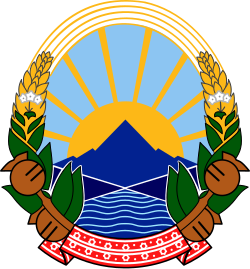| Party | First round | Second round | Seats |
|---|
| Votes | % | Votes | % |
|---|
| Alliance for Macedonia (SDSM–LPM–SPM) | 291,695 | 29.49 | 329,700 | 48.50 | 87 |
| VMRO-DPMNE | 141,494 | 14.30 | 32,838 | 4.83 | 0 |
| Democratic Party | 108,872 | 11.01 | 30,928 | 4.55 | 0 |
| Party for Democratic Prosperity | 87,103 | 8.81 | 93,407 | 13.74 | 10 |
| People's Democratic Party | 29,361 | 2.97 | 25,007 | 3.68 | 4 |
| Democratic Party of Macedonia | 20,243 | 2.05 | 3,991 | 0.59 | 1 |
| Liberal Party | 15,068 | 1.52 | 21,362 | 3.14 | 5 |
| Workers Party | 15,416 | 1.56 | | 0 |
| Democratic Party of Turks | 14,423 | 1.46 | 6,434 | 0.95 | 0 |
| Social Democratic Party | 12,055 | 1.22 | 2,254 | 0.33 | 1 |
| Movement for All-Macedonian Action | 11,479 | 1.16 | 2,013 | 0.30 | 0 |
| VMRO-DP [ mk ] | 9,742 | 0.98 | 458 | 0.07 | 0 |
| League of Communists of Macedonia | 7,610 | 0.77 | | 0 |
| VMRO-MNDS | 7,167 | 0.72 | 1,191 | 0.18 | 0 |
| Party of Democratic Action–Islamic Path | 6,912 | 0.70 | 2,155 | 0.32 | 0 |
| Socialist Party | 6,612 | 0.67 | 5,632 | 0.83 | 1 |
| Party for the Full Emancipation of the Roma | 6,530 | 0.66 | 4,447 | 0.65 | 1 |
| Workers Party of Macedonia | 5,435 | 0.55 | | 0 |
| Democratic Party of Serbs | 5,290 | 0.53 | 4,003 | 0.59 | 0 |
| Communist Party of Macedonia | 5,161 | 0.52 | | 0 |
| VMRO-Fatherland | 5,133 | 0.52 | | 0 |
| Democratic Union–Party of Peasants | 5,089 | 0.51 | 681 | 0.10 | 0 |
| Social Democratic Union | 4,182 | 0.42 | 4,635 | 0.68 | 1 |
| Christian Democratic Party | 4,019 | 0.41 | | 0 |
| SDSM–LPM | 3,945 | 0.40 | 5,674 | 0.83 | 1 |
| DPTM–SDA-IP | 3,467 | 0.35 | 4,681 | 0.69 | 1 |
| Agricultural Workers Party | 3,362 | 0.34 | | 0 |
| SDSM–SP | 2,538 | 0.26 | 2,872 | 0.42 | 0 |
| Party of the Unemployed | 2,191 | 0.22 | | 0 |
| Civic Liberal Party | 2,019 | 0.20 | | 0 |
| Party of Yugoslavs | 1,570 | 0.16 | | 0 |
| Republican Party | 1,272 | 0.13 | | 0 |
| VMRO - Obedineta | 943 | 0.10 | | 0 |
| Democratic Union of Educators and Citizens | 822 | 0.08 | | 0 |
| Party of Social Truth | 724 | 0.07 | | 0 |
| Macedonian National Party | 715 | 0.07 | | 0 |
| Democratic Progressive Party | 676 | 0.07 | | 0 |
| New Communist Movement | 633 | 0.06 | | 0 |
| VMRO-Gotse Delchev | 480 | 0.05 | | 0 |
| Democratic Party of Yugoslavs | 422 | 0.04 | | 0 |
| DP–New Social Democratic Party | 386 | 0.04 | | 0 |
| Republican Party–VMRO-Gotse Delchev | 205 | 0.02 | | 0 |
| Multinational People's Party | 151 | 0.02 | | 0 |
| Independents | 136,511 | 13.80 | 95,418 | 14.04 | 7 |
| Total | 989,123 | 100.00 | 679,781 | 100.00 | 120 |
|
| Valid votes | 989,123 | 94.79 | 679,781 | 96.24 | |
|---|
| Invalid/blank votes | 54,330 | 5.21 | 26,580 | 3.76 | |
|---|
| Total votes | 1,043,453 | 100.00 | 706,361 | 100.00 | |
|---|
| Registered voters/turnout | 1,487,367 | 70.15 | 1,293,330 | 54.62 | |
|---|
| Source: Nohlen & Stöver, Slavic Studies Centre |



